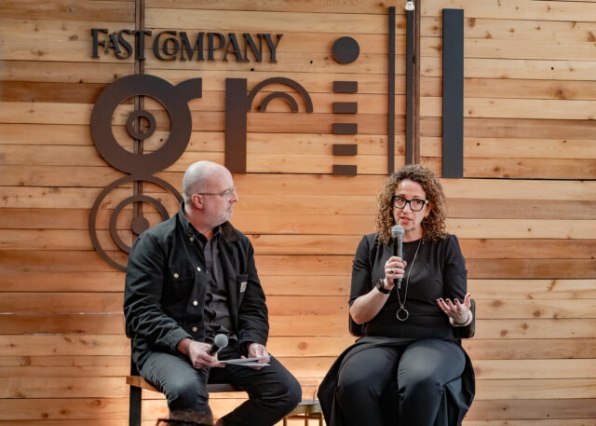The Future Today Institute has released its 17th Annual Tech Trends Report, a report on the future across 16 industries and sectors and following 900 trends. The theme of this year’s report is the super cycle, which, in general, is an extended period of booming demand that leads to elevated prices at unprecedented heights. A super cycle can last years or even decades, and leads to or is driven by structural change in the economy.
Fast Company‘s editor-in-chief Brendan Vaughn sat down with the founder of the Institute, Amy Webb, at the Fast Company Grill at SXSW to discuss some of the highlights.
Webb says that most super cycles are kicked off by an event: For instance, the invention of the steam engine kicked off the Industrial Revolution, and the internet kicked off two decades of structural change.
“The difference between what’s happening right now and what happened in the past was that before, the super cycles were just one technology,” says Webb. She says now three technologies are pushing the supercycle: artificial intelligence, biotech, and an ecosystem of interconnected wearables.
“We’re at the beginning of something that will really reshape human civilization,” she says. And through that, she thinks companies that create infrastructure will be in high demand, and ultimately a lot of white-collar tech jobs will ultimately be going away.
Rather than looking at what that means from a financial standpoint, the Institute’s report looks at the super cycle more holistically, and how it will impact business, government, and society as a whole.
“I know everybody’s talking about artificial intelligence right now. It is not new, it’s just that it’s broken through to the sort of critical mass, and it’s starting to create a flywheel of activity in other spaces,” says Webb.

Webb says that AI is a foundational layer that is a catalyst for change in several areas.
In the short term, she says, we’re going to have to start making important decisions regarding AI. One big one is open source versus not open source. A closed model like OpenAI’s can be good because it creates a walled garden of sorts that can be hard to corrupt; however, you don’t necessarily know what data went into training the AI, and without that transparency, the results you get from it can be potentially skewed.
On the other hand, a semi-open or fully-open model is more vulnerable and can be easily corrupted. For instance, when Llama 2 was launched from Facebook, someone cloned it and called it Llama 2 Uncensored, which Webb says you “could do really horrible things” with.
Now, she says we’re at a point where the AI systems we’re using don’t necessarily need “more” data, but they need “more types” of data. For instance, we need to train AI in things like how people move around and how they might describe a particular smell. While we’ve captured a lot of the digital world in training these models, we haven’t captured much of the physical world, which is where something like Apple’s Vision Pro could come into play.
“I could see going forward, everything having a digital twin,” says Webb. Ultimately she thinks everything from your house and office building to your body will have its twin in the virtual world.
A physical world turned digital
Why is it useful to have a digital twin? “Because we can track changes over time, and that would be incredible for any building,” says Webb. “It also allows you to simulate and test changes in advance.”
Those digital twins won’t come without a few challenges. For instance, Webb notes that we all have millions of motions we do each day, that we aren’t even aware of. For instance, you might talk with your hands or scratch your eyebrows when you’re nervous.
“So the problem is, when you’re wearing a face computer, your face computer is going to start recognizing every single thing that you do,” she says. “On the one hand, it’s good, it’ll identify and associate that information with you.”
On the other hand, that might become problematic if you have a personal and business account on your face computer, just like many of us do on work phones and computers now. That computer will still log activities as you, perhaps very personal ones, even when you’re logged out of work and are at home.
“There is no way to reset your movement identity the way that you would reset a password. It is you. It’s who you are,” she says.
AI might also impact how we shop. Webb specifically pointed to the dynamic pricing we heard about a few weeks ago at Wendy’s. While Wendy’s wasn’t implementing surge pricing like everyone originally thought, the company is offering discounts on products during specific times of day.
Webb says that the next move after generative AI is likely generative biology: While we won’t have personalized medication right out of the gate, over time we’ll be able to have more personalized and better medication and medical care thanks to AI. And just like in super cycles past, like during the Industrial Revolution and the internet revolution, we’re on the precipice of change in almost every aspect of our lives.
Connectez-vous pour ajouter un commentaire
Autres messages de ce groupe

The role of the CFO is evolving—and fast. In today’s volatile business environment, finance leaders are navigating everything from unpredictable tariffs to tightening regulations and rising geopol

In June, Google released its newest smartphone operating system, Android 16. The same month, Apple previewed its next smartphone oper


I’ve worked at the bleeding edge of robotics innovation in the United States for almost my entire professional life. Never before have I seen another country advance so quickly.
In


Restaurant industry leaders are excited for

Elon Musk’s anger over the One Big Beautiful Bill Act was evident this week a
